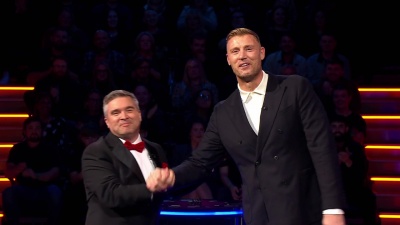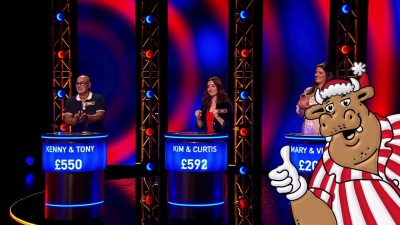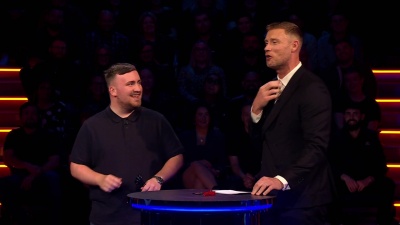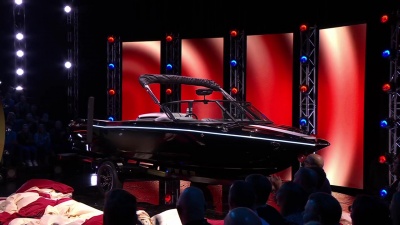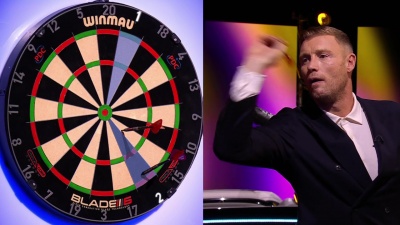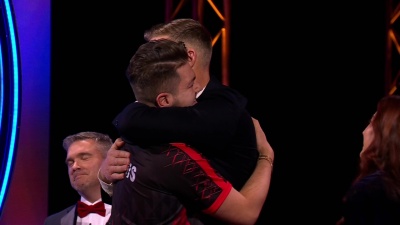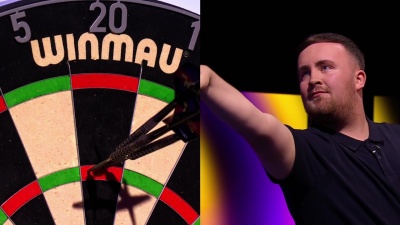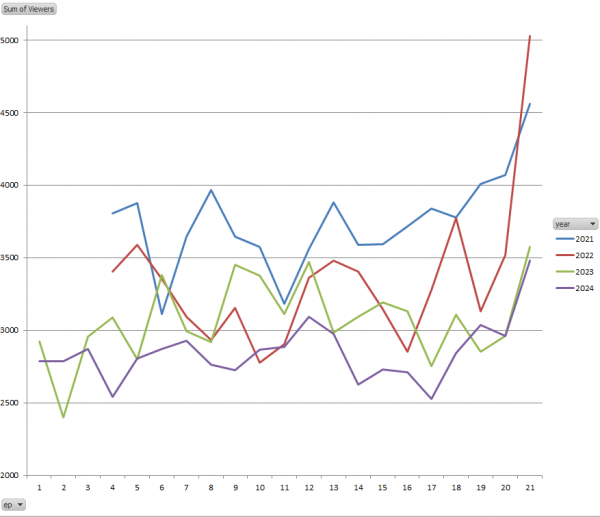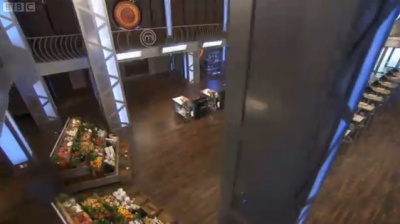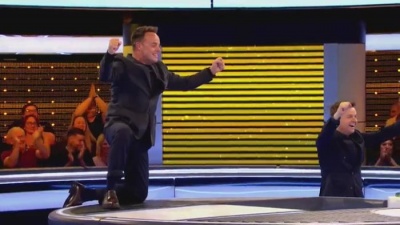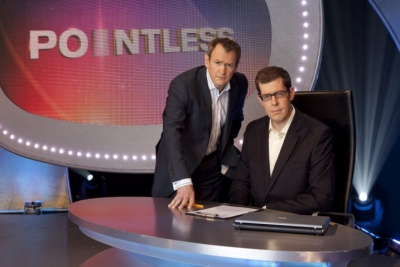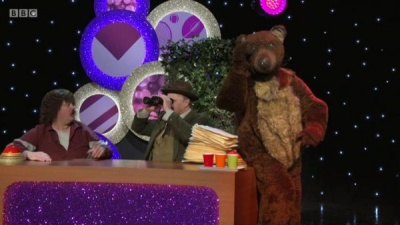Weaver's Week 2025-02-02
Last week | Weaver's Week Index | Next week
There is a 10% chance that the Challenge channel is showing an episode of Bullseye right now. There's a 20% chance that one of the ITV channels is showing this episode of Bullseye.
Contents |
Bullseye
12 Yard for ITV, 22 December 2024
What is Bullseye? One of ITV's most significant game shows. If the fifties were Double Your Money, the sixties Opportunity Knocks, and the seventies The Golden Shot, then the 1980s can be summed up as the decade of Bullseye. Jim Bowen, a Lancashire comedian who never looked at home on telly, hosted a game of quizzing and precision, of throwing and knowing.
Bullseye ran from 1981 to 1995; took a few years to find its feet, the first series is almost unwatchably weird, but by the mid-80s it was comfortable Sunday teatime viewing. (Except in some regions, where the show went out at about 2pm, before the big football match. They're strange in Yorkshire.) There have been attempts to revive Bullseye, most notably a full series that went out on the Challenge channel in 2006. The 2024 programme, surely a pilot for a full series, honoured most Bullseye traditions, while subtly tweaking the format for modern audiences.
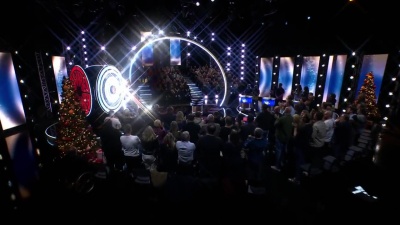 Audience on both sides of the arena, with the board to the left, and Christmas trees for the time of year. (12 Yard)
Audience on both sides of the arena, with the board to the left, and Christmas trees for the time of year. (12 Yard)
Professional Lancastrian as host, check. Freddie Flintoff is the new man. He rose to prominence about twenty years ago as an international cricketer, and since retiring he's done laddish shows like Top Gear and Cannonball. Freddie has kept his Lancastrian accent, and comes across as an ordinary person who got lucky – there's a refreshing rawness to his on-screen persona.
Three pairs of players, check. One who sits behind a desk and prepares to answer questions, one who sits on a sofa and prepares to throw darts. We appreciate how the throwers are all wearing the same shirt, customised into their colour; we appreciate how the knowers are wearing something in their team colour. Little details like this can elevate a programme.
Category board, check. Ten sections to shoot at in the first round, with questions getting harder as the round progresses. Categories are familiar from previous series: they're Music, Food and Drink, Sport, Places, Nature, Film and TV, Britain, Books, Showbiz, Spelling. Questions are worth £50 each, except for the final round where they're worth £100. Bonuses have also gone up – £50 for the outer segment in the chosen category, then £100, £150, and £250 for the bullseye.
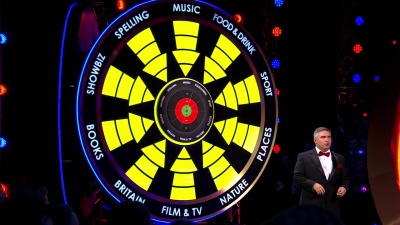 On the board tonight: food and drink, sport, places, nature, film and tv, Britain, books, showbiz, spelling, and music. (12 Yard)
On the board tonight: food and drink, sport, places, nature, film and tv, Britain, books, showbiz, spelling, and music. (12 Yard)
Unlike in the eighties original, questions appear on screen for us at home. There's also an animation of Bully after every single question. Every last question, the same animation of Bully snorting. Perhaps they might have rationed the animation's appearances, or developed a couple more skits. This round is a little slower than in the eighties, not so slow as to feel dragged out.
After a commercial break, we're into round two. Pounds for Points has the throwers scoring as many points as they can, and whoever scores the most gets first look at the question – a right answer earns a quid for each point scored. Hit 66 points, and the question's worth £66.
Now, the problem here is that £66 is not enough to change the game. After the first round, the scores were £550, £550, £200. The bottom side needs to win all three rounds, and with massive scores that even professionals would find difficult. So they have a fourth round of throwing, a question based on the score of the professional darts player – in this pilot episode, it's Junior Sports Personality of the Year and future PDC champion Luke Littler.
"Making his Bullseye debut," crows Freddie Flintoff. Mate, Luke was still a twinkle in his parents' eyes when Bullseye was last on our screens, he celebrated his eighteenth birthday a few weeks after this ep went out. Luke is invited to throw a set of darts, he scores the maximum 180 (of course), and the question on the buzzer will decide who goes through to the next round. The two losing teams go home with their cashpots, Bullseye darts and tankards, and the exclusive Bendy Bullies.
Part three begins with a suggestion of what might be Bully's star prize at the end of the show. Bullseye has attracted some retrospective notoriety for always giving away speedboats as prizes – we might have heard more cracks about this impression than the show actually offered fast boats. Leaning into the myth, the show drops the curtain and reveals – a speedboat! "They're a pain to park outside your flat, and we've an even better prize to give you!" promises Freddie, able to read fluently from the autocue. Bonus points for avoiding another show's catchphrase.
The charity challenge is next, and this is the first really big change from the eighties series. Back then, it was the guest professional, nine darts, £1 for each point scored, doubled if the professional hit 301 points. For this show, Freddie and Luke do a "round the clock" challenge, hit every number from 1 to 20, ending on the bullseye. Luke's scores only count if he hits a double or treble, Freddie can hit singles. £100 for every number struck in three minutes, £5000 if they make it to the bull – and of course they make it to the bull. Boom, a one-minute bit has been turned into a five-minute bit, and it makes for better television. Or it would, if the timing was clearly honest.
Bully's Prize Board is next, a good prize hides behind each of eight segments on a special board, with another prize at the bullseye. There's a bunch of kitchen equipment, a trip to Cornwall, a flipping mobile phone. And there are some less useful prizes: a pair of electric toothbrushes, and they're trying to flog hairstyling equipment to two bald men. Six darts for the regular thrower, and three for the knower.
Except... they offer the services of Luke Littler to throw the knower's darts. Answer questions about the professional's first eighteen years, Luke will throw one for each right answer. It's a way to get even more value out of their booking, and a way to make sure the prize bill goes up and up and up. Thanks to a very competent thrower contestant, our pair get eight prizes – including the hair dryers.
 A litany of goods, including a Chrismas hamper, tickets to the darts championship, a freezer and chips, and a bonus dart for the final. (12 Yard)
A litany of goods, including a Chrismas hamper, tickets to the darts championship, a freezer and chips, and a bonus dart for the final. (12 Yard)
So, will they go for the prize gamble – risk this litany of prizes to potentially add a mystery star prize (not a speedboat, could be a brand new car, could be a luxury cruise). Or keep what they've got, and let the runners-up have their choice? With eight very decent prizes, the winners cut and run, and that's such the right decision. The runners-up have a go, fall a bit short, and get hugs from Freddie Flintoff. Hmm, never saw Jim Bowen hug anyone.
So that's the show. We've barely mentioned the scorer and announcer Richard Ashdown, he's perfectly competent and that is all we ask for from anyone in his position. The original music might have been re-orchestrated – and they didn't play the Sad Losing Music – but enough of the old tunes were there to tick all the nostalgia boxes.
And nostalgia was the key to this show. Original hosts Jim Bowen and Tony Green are no longer with us, but their presence echoes through the years to this revival. Freddie Flintoff, like Jim Bowen, is a lad from Lancashire, he's not a natural television presenter (Freddie was a cricketer, Jim a stand-up comedian). He's a warm chap, wants everyone to do their best, and his respect for the contestants comes across on screen. Did they need to repeat this episode twice on the main ITV network over the next fortnight? No, but they did.
All of the rounds were present and correct. The extended charity throw was a very good idea, it gives the host more involvement in the spectacle, and also happens to extend the segment by a few minutes. We're much less warm on "pounds for points" as it stands, the round gets overshadowed by the category board before it, and the buzzer question tilts the game just too far towards the knowers. Perhaps they might add everyone's scores together and say you're playing for £153 (or whatever the total is), top score gets first answer. Perhaps seed the pot with one dart from the professional. Perhaps we got unlucky on this edition and most times it'll work.
Ultimately, we watched and enjoyed Bullseye. It felt rather long, like a 45 minute show stretched out to a full hour. They're not going to get Luke Littler every week, and a little less "business" with the professional should help to trim the programme down to its natural length. We would lay good money on Bullseye coming back for a full series – perhaps Sundays at 5.30 in November and December, after it's dark outside and before Countryfile starts.
Did Masterchef The Professionals lose viewers this year?
During the autumn, we heard about some unpleasantness involving Gregg Wallace, a Masterchef host. We're not going to rehearse the claims, and we're not going to speculate too hard about the show's future – whatever happens will happen.
We can, however, report on the viewer reaction. And we can put up an approximate graph showing the last four years' episode-by-episode viewing figures.
Eyeballing the graph, it looks like the 2021 series was more popular than any since, 2022 picked up after a slow start, and 2024 was below 2023 for most editions. But then 2022 was during the football tournament, and what do the statistics say?
We can run a direct comparison between the two series. Show for show, 2023 was on top in 18 episodes, 2024 in three – of which two were by less than 10,000 viewers.
But then we recall that Masterchef wobbles through the schedules like a particularly inedible custard. Comparing shows on the same night (Tuesday to Tuesday and so on), we see 2023 won 14 direct comparisons, 2024 won just two – the launch show and the final.
We heard on 28 November that Gregg Wallace was stepping back; that night's edition was down 465,000 on the comparable episode in 2023. This wasn't unusual, four of the previous eleven comparable eps had seen greater losses, and there had been a sizable drop the previous week when the reports first broke.
Ah, but isn't all telly losing viewers these days? To test this idea, compare the Masterchef ratings with those of another programme which runs on BBC1 in the evening – Have I Got News for You. Ratings for Ian and Paul and Lard were basically static: two weeks were better in 2023, two weeks better in 2024, six weeks had a difference of less than 0.1 million viewers.
So, yes, we can see that Masterchef has lost viewers compared to the prior year. Is that related to the misbehaviour of a lead star? We cannot say that for certain: it is also possible that the viewing audience has had enough Masterchef because it feels like the show has been on all the time for the past few years.
Whatever the ratings say, we are aware that there is a professional inquiry happening into Wallace's behaviour, and it feels inappropriate for this column to pass judgement on him. Once the report enters the public sphere, then we might comment.
In other news
Cheered by one of the contestants on Popmaster: didn't know about Bob Dylan, did know about Bob the Builder. Priorities sorted!
Limitless Win finished its series a couple of weekends ago, having been squished into three weeks when it might naturally have luxuriated across six. The show is fun to play along with, but has a massive problem at its heart: whenever a team plays on, and then takes the money, it comes across as an anti-climax. They've won £75,000, but they could have made it to £1.5 million. Life-changing amounts of money won, life-recasting amounts of money dangled in front of them like massive golden carrots. Although the viewing audience is there, the show feels stale and predictable and a bit mean. Maybe now is the moment for ITV to give Limitless Win a limitless rest.
The Inner Circle has been given a press release, ahead of a run on BBC1 later in the year. The new show is hosted by Amanda Holden, and made in Glasgow. The presser said:
- Across each episode, contestants will battle to win the cash prize and will be tested not just on what they know – but which of their fellow players they can trust. As the contestants make their way through a series of games and challenges they’ll need to decide which of their opponents they’d be prepared to join forces with in order to take home the prize…but in a gripping finale, could each of the final two face the ultimate betrayal?
Hope it's not the Shafted / Golden Balls / The Bank Job ending; if it is, we might just write a Brief History of the Prisoner's Dilemma. The Inner Circle has five weeks on daytime, presumably in the Bridge of Lies 4.30 spot, plus six Saturday celebrity specials. We can't recall a new show getting celeb editions in its first series since 5 Minutes to a Fortune. Anyway, The Inner Circle is made by Tern TV, best known for documentaries like Dolly The Sheep That Changed the World.; we think this is their first game show commission.
We also hear that The Answer Run is coming back for a second series. It's the one where Jason Manford swipes right and swipes left. Came second in this site's Poll of the Year 2024, behind Gladiators and ahead of Bullseye. ITV swept the worst new show award, filling out the top five in a year where no BBC format was disliked. The Traitors tied with Only Connect as Best Game Show Around Right Now.
Quizzy Mondays
Two more quarter-finals on Only Connect, the first saw Four Opinions defeat the Al Frescans 24-18. Going for it early proved profitable, as the Opinions took three on each of their first two questions. Al Frescans made the only major move in a quiet Connections round, spotting books written by Prime Ministers ending with "Grow Your Own Lettuce: An Idiot's Guide". The Frescans dropped points on the wall, missing a group of anagrams of French cities; their opponents spotted anagrams of Italian places.
Crunchers eliminated the Bloomsbury Group by 20-18, in a match of two unbeaten sides. The sequences fell for the Crunchers, especially facts about elements Na, Ne, Ni, and No. The teams were beaten by hosts of The Late Late Show, which is now presented by Patrick Kielty; and by companies with yellow squares as their icons. The decisive moment came when the Bloomsburies could not unscramble the wall, defeated by the plethora of opportunities. Even so, they did their best, recovering seven points in Missing Vowels, a hell-for-leather run that reminded us of quiz legend Ian Bayley on Counterpoint a few years back. Crunchers go to the semis, Bloomsbury Group will surely be back on a special.
Over on University Challenge, Christ's Cambridge beat St Edmund Hall Oxford by 215-100. The team did enough to win, a performance better than average on almost every metric (though a second successive 57% bonus rate will count against them), but didn't dominate the game and were almost pulled back by the Oxford side. A lot of social studies questions in this match, just as there were in Christ's heat. Answer of the week came from Sophia Bursey, the St Edmund Hall captain, who got the "T-A-M" of linguistics (tense – aspect – mood) without waiting for Rajan to waffle on.
Queen's Belfast beat Cardiff in a game of two halves. Queen's leaped to the first starter, and the next one, and lots after that. By the music round, the Belfast side had 140 points, Cardiff were stuck on minus 5, having already heard the dread call "Plenty of time". When Cardiff did get a starter, the host chucklesomely said "This could be the start of a great run". Not quite, but it was adequate: Cardiff won the second half starter battle 5-3, and narrowed the final gap to 180-70.
Quiz digest
This fortnight, we learned:
- University Challenge asked about the Dunning-Kruger effect, Only Connect about a failed horticulturalist from Leeds, and all on the day Pointless shuffled to BBC2 in favour of propaganda from the newsroom. Are these facts connected? (Almost certainly not: that's apophenia.)
- Pointless Celebrities is recorded in the same studio as The Muppet Show. A programme where well-meaning showbiz visitors perform their best under unfamiliar circumstances and are jovially heckled by two old men who hide behind desks, Pointless is hosted by Statler and Waldorf.
- Storms have been given names on these islands since autumn 2015. A separate naming convention applied in Germany, so the storm we knew as Abigail became Frank when moving towards Scandinavia.
- Fern Britton proved far better than this column on House of Games. The spelling round, particularly. Fern got the pop singer Anastacia, the greatest University Challenge host Bamber Gascoigne, and the yoghurt-and-cucumber dip tzatziki. Is there any word this wonder cannot spell?
- And we left the last edition on the original cliffhanger. In the Thomas Hardy serial novel A Pair of Blue Eyes, one part ended with Henry hanging over a precipice. He escaped by virtue of his travelling companion Elfride, a Victorian woman who was wearing many layers of clothing. She was able to partially disrobe, fashion a makeshift rope from her garments, and throw it to Henry to help support him up the slope.
A change to our planned publication order: we completely forgot that University Challenge finishes its elimination round next week, and we want to do a stats pack from it. We'll also cover Pictionary next week, so The Traitors will follow in two weeks hence. (And this is why we don't publish our plans too far in advance: stuff happens.)
A quiet week for new shows. Too quiet. Outsiders pops up on BBC2 (Tue). The Late Late Show (RTÉ1, Fri) selects RTÉ's entry for the Eurovision Song Contest in Basel. And – ssh! – Holly Willoughby is on a Celebrity Bear Hunt (Netflix, Wed).
To have Weaver's Week emailed to you on publication day, receive our exclusive TV roundup of the game shows in the week ahead, and chat to other ukgameshows.com readers, sign up to our Google Group.


